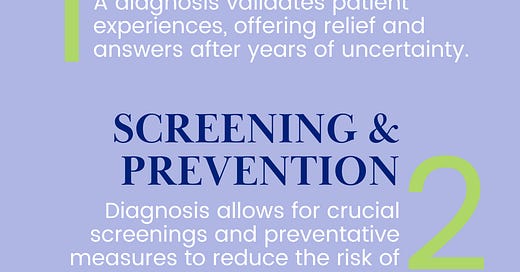Why does an Ehlers-Danlos Syndrome (EDS) diagnosis matter?
10 Reasons Why it Matters More Than You Might Think
A misconception that I often hear is that an evaluation and official diagnosis doesn’t matter if there aren’t FDA-approved therapies or cures for Ehlers-Danlos Syndromes (EDS). This idea persists not only within the EDS patient community but also among healthcare providers. While it’s true that there aren’t any direct treatment options or cures outside of symptom management and screening (yet), a diagnosis is still important. Here's why it matters more than you might think:
Validation: Living with EDS comes with a lot of challenges, both physical and emotional. A diagnosis validates these experiences and for many people it can be the first time they receive answers for their health in years, even decades.
Screening and Preventative care: Screening for conditions such as aortic dilation (especially in vEDS), ocular health concerns like retinal detachment, and other conditions can be crucial in EDS management. Early diagnosis facilitates prompt screening, allowing for timely intervention and reducing the risk of life-threatening events. Preventative care can also include physical therapy to protect the joints from future damage and injury.
Access to Experts: Healthcare providers who understand EDS can be difficult to find. With a diagnosis, comes the ability to find providers/receive referrals to providers who can offer treatment strategies to help manage your symptoms and improve your quality of life.
Emergency Care: In emergencies or accidents, health symptoms can be due such as dislocations or vascular incidents and healthcare providers must be aware of the patient's EDS diagnosis to provide appropriate care. This knowledge can prevent unnecessary delays in treatment and minimize the risk of complications. Without a diagnosis, EDS-related causes could be overlooked.
Family Planning & Genetic Testing: EDS is inherited, and a diagnosis provides information for family planning decisions. It empowers individuals to make informed choices about reproduction and facilitates genetic testing for other family members (for all types of EDS except for hEDS).
Surgical Care: An EDS diagnosis ensures that healthcare providers are aware of the patient's condition, enabling them to take necessary precautions and employ specialized techniques during surgical procedures for better outcomes.
Comorbidity Awareness: EDS often coexists with other conditions such as Mast Cell Activation Disorder (MCAD), Postural Orthostatic Tachycardia Syndrome (POTS) and gastrointestinal manifestations. A diagnosis of EDS may indicate to providers if some symptoms could be caused by well-known comorbidities and allow providers to address them effectively with a picture of your overall health.
Educational Resources and Support: A diagnosis opens doors to educational resources and support networks tailored to individuals with EDS. From online communities to local support groups, access to these resources can empower patients with knowledge and connect them with others facing similar challenges.
Advocacy and Awareness: With a diagnosis (although it is certainly not required here), individuals with EDS can become stronger advocates for themselves and the EDS community. They can raise awareness about the condition, and advocate for improved research and healthcare.
Research Participation: Research study participation is only inclusive of those with a diagnosis. If patients wish to participate in studies and play a rule in advancing scientific understanding and improving outcomes for future generations, a diagnosis is necessary.
What are some reasons a diagnosis matters to you?










This all resonates so much with me! For example, I am currently preparing for a surgery to shore up the ligaments in my ankle and the surgeon is planning to use tissue from an allopathic (deceased) donor who had non-hypermobile tissues, in conjunction with the synthetic band he’ll also put in. If I didn’t have hEDS, he’d use only the synthetic piece and not reinforce with the stronger donor tissue. He and I were just discussing this yesterday and you post is therefore very timely!
Is there any doctors other than rheumatologist who will diagnose. I have had my diagnosis for years but my friend is having trouble finding someone who will diagnose him. Major medical center??? Any help would be appreciated.